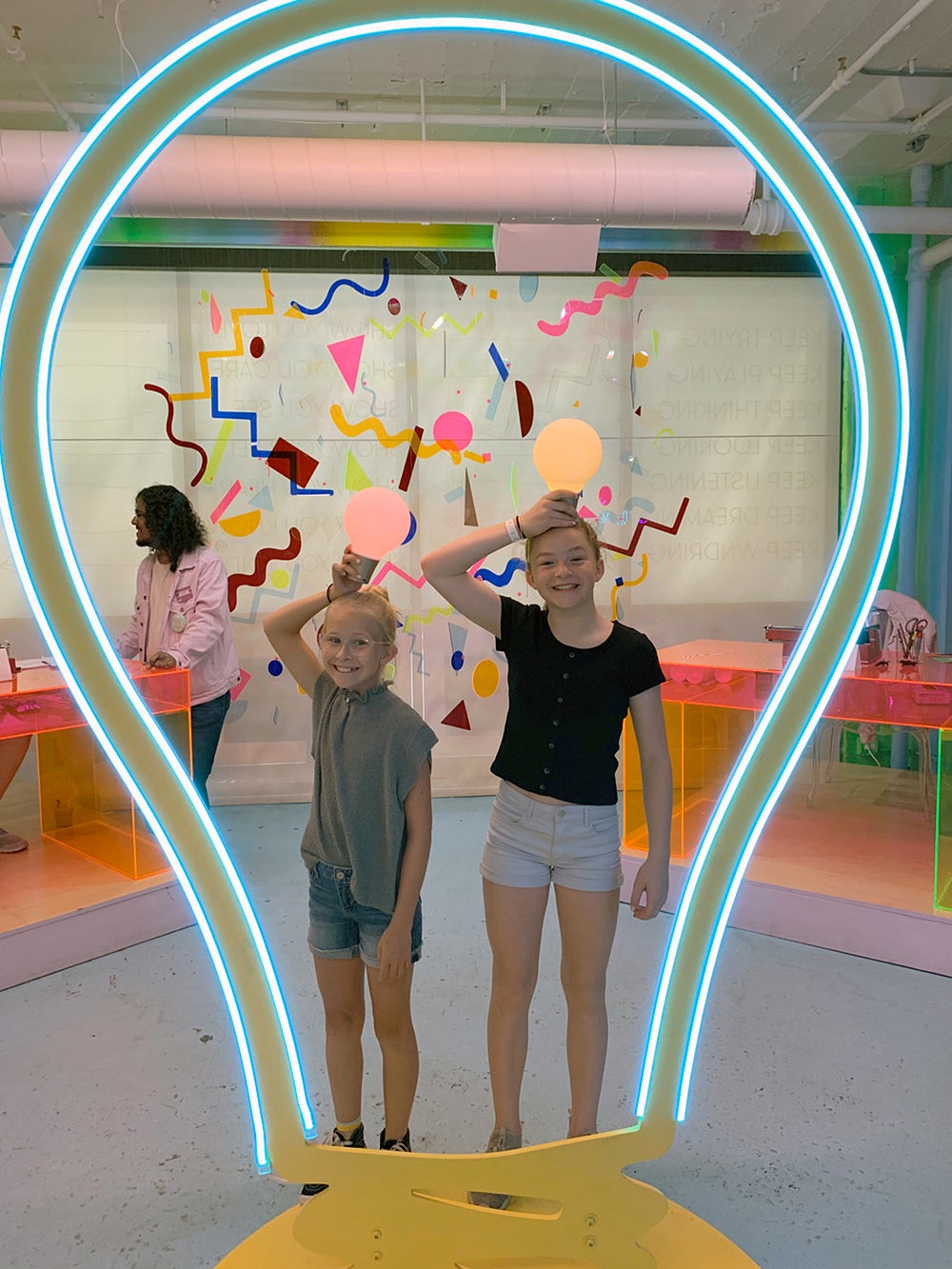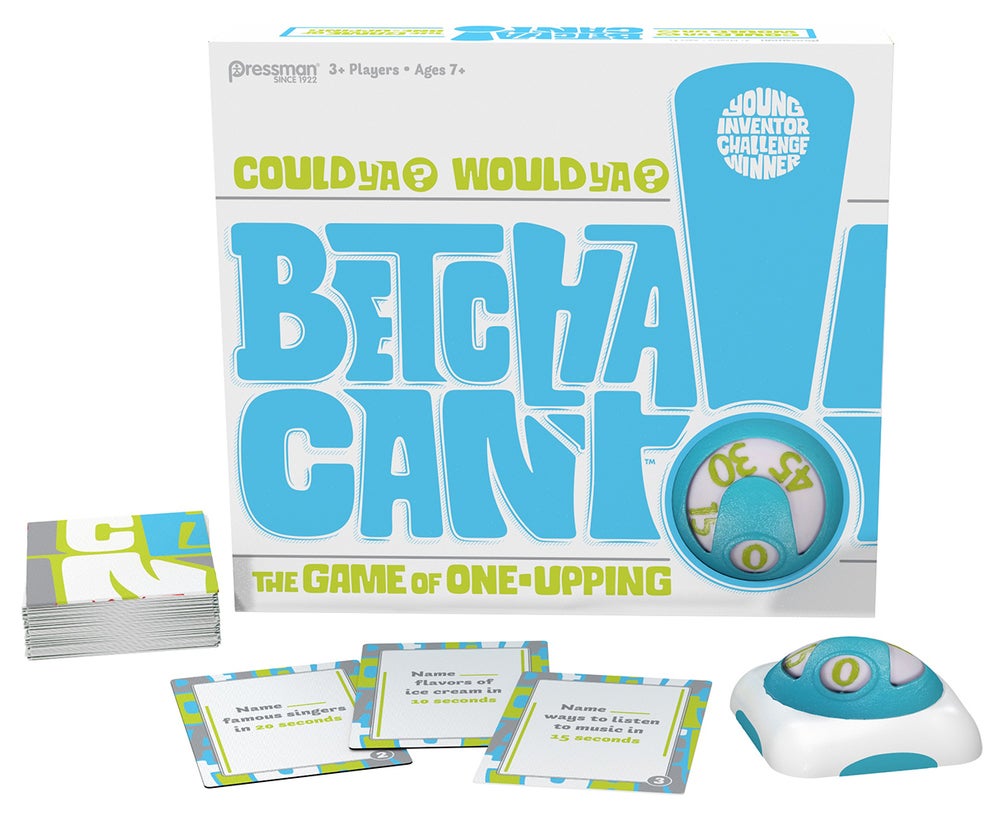These 13-Year-Old Board Game Creators Can Teach All Entrepreneurs a Thing or Two Lily Brown and Tait Hansen got an early crash course in how the business world works, and have some insights to share.
By Kenny Herzog

It doesn't take long to realize why Lily Brown and Tait Hansen clicked as friends and co-collaborators. The two 13-year-olds don't finish each other's thoughts so much as round them out. Neither jumps at talking just to be heard; they both take a beat and bat around a question in their head, searching for the truest and most thoughtful answer. They are, in essence, natural conversationalists, which perhaps demonstrates how they successfully completed a years-long — and, for a chunk of that time, long-distance — start-and-stop process of creating and designing their own board game.
The result of their efforts, Betcha Can't! (originally called Bet You Can't in earlier iterations), did more than merely entertain friends and relatives. The game of wits invites players into a good-natured gauntlet of one-upmanship to see who can call to mind the most trivial information on a subject (e.g. the various types of vegetables or modes of transport) in a finite amount of time. It won a share of the grand prize for "Most Marketable Concept" at 2018's Young Inventor Challenge, part of the annual Chicago Toy and Game Week.
Contest sponsor Pressman Toy Corporation quickly picked up the game and worked with Lily and Tait to modify some aspects (the aforementioned title tweak, converting from a classic board format to a timer-based, quiz-card presentation, etc.) and readied it for mass release. As of this spring, Betcha Can't! has been available nationwide via the original contest's other sponsor, Target.
Related: Why Did This 17-Year-Old Turn Down $8 Million for His Coronavirus-Tracking Website?
Lily and Tait each Zoomed in with us one recent afternoon via their respective homes in Alpine, Utah and Emerson, Illinois (the two were once neighbors in Illinois before Lily moved west) to talk about their insatiable curiosity, commitment to the concept, lives as budding inventors amid classroom closures and — most crucially — what they took away from the very grown-up experience of working alongside their corporate benefactors.

When did it occur to you guys that you had an idea that might have potential beyond your own entertainment?
Tait: We play-tested it with my family, and it kind of clicked to me when everybody seemed to be having so much fun and no one had played a game like it before.
Lily: Same. All the compliments we were getting, like, "Girls, this is so fun. We love it. It's gonna be a winner!" And that's when I realized, oh, this really could win.
What was the balance between going to your parents for mentorship and being totally self-sufficient?
Lily: My dad invents games, so we didn't try to look to him too much, because we really wanted to come up with it on our own. So if we did win and people were like, "Your dad made games, he probably helped you," we could be like, "No, we did it all by ourselves." So we didn't look to them as much in the game designing process.
Tait: Yeah, I wanted it to feel like our game only and didn't want to feel like we had so much help from adults. But since we were so young when we started it, we did need help a little bit, but for the most part, it was pretty independent.
Is there anything about developing the game you may have done differently in hindsight?
Tait: Since we started the game in third grade, I would have kept going then instead of dropping the idea of making a game for two years. Because by now, we could have made multiple games and it would have been better in my mind.
Lily: Yeah, I agree. I think it would have been good if we just believed in the game right when we made it. Then, a year later, we were thinking maybe we should make another game and really enter it this time, but we couldn't think of a game. And then we realized we could go back to the one we made before. So if we kept with it, that never would have happened, and we would have been able to enter the first year.
Once Pressman got involved, what was some of the constructive feedback they had?
Lily: When we first made the game, we had a board and we heard the board was too long or didn't really feel like it was interacting as much.
Tait: Yeah, I remember when we were first told that, we were like, "Oh, this is our game. We wanna keep it how we designed it." And I really wanted to use the board, but when we play-tested it for the first time without the board, we realized it wasn't really necessary.
What feedback did you get that you ultimately rejected?
Tait: After [the contest], we got to read the feedback that people who were judging us wrote down, and there was one that was like, "I've seen this concept in so many other games." And I was like, I've never played any game like this. I don't know what you're talking about. [Laughs]
Lily: Yeah, there were a couple of those comments, where I'm like, "Are you sure you're talking about our game?"
Related: Meet 16 Teen Founders Who Are Building Big Businesses — and Making Big Money
Do you think you'll pull off another collaborative project like this despite the distance between you?
Tait: I'd like to make another game with Lily, but I don't have any specific plans. I'm just kind of figuring stuff out right now.
Lily: Same. I think we'd enjoy making another game together. I don't have an idea right now. I have a couple in the back of my head that might turn into something, but I guess we'll see. [Laughs]

Has there been any inspiration missing by not being around your mentors at school these past few months?
Tait: I don't think school inspired me very much, but it might have been inspiring without me realizing it, so it has been feeling a little bit different.
Lily: It was nice to have something where I knew other people there knew about it and could support me through it, but it didn't inspire me through the game process.
Have you guys always been this ambitious? It just seems like you're wired for ingenuity.
Tait: When we'd hang out with each other, we'd try to make a lot of different businesses when we were younger, so I feel like our minds might have worked a little differently. We didn't really enjoy dressing up as princesses.
Lily: Yeah, we made a massage chair with totally random materials around the house, like straws and popsicle sticks and ping-pong balls and glue them all together and said, "Look, this is a massager!" At one point we even hung fliers around the neighborhood and were like, "We have a business now." We were probably 8 or 9. We didn't get any customers, but we thought we were gonna be super-successful.
Now that you've gotten this early taste of the business world, has it deterred you or do you think you can hang with it?
Tait: I didn't really know what it was like, and I was expecting it to be so much more serious and all adults being so serious about what they were doing. But it's not really like that. Everyone loves what they do. It was a lot more fun than I was expecting.
Lily: Yeah, when we were in interviews, people weren't uptight and stuff, They were just asking us fun questions.
Do people need to play Betcha Can't! by the rules to enjoy it, or do you want people to just have a good time with it in whatever way works for them?
Lily: I found this random YouTube channel with this couple playing our game, but just with the cards and not really playing it and one-upping each other.
Tait: I'm just happy people can interpret the rules however. I don't really mind if they're not playing it exactly how we meant it to be played. As long as they're having fun with it, I'm fine with that. Even me and my family do that. We go on road trips a lot, and sometimes it's easier to make up your own cards and play it how you want to play it.
Lily: As long as they're having fun with it, we would encourage it.











